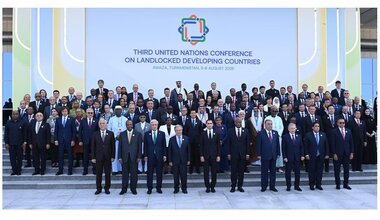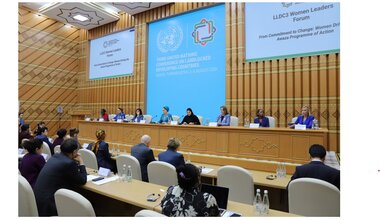SECRETARY-GENERAL'S BRIEFING TO THE SECURITY COUNCIL ON WOMEN, PEACE AND SECURITY
New York, 29 Ocober 2020
Thank you, Mr. President.
Excellencies,
I thank you for this opportunity to brief you on Women, Peace and Security, twenty years after the landmark Security Council resolution 1325.
The COVID-19 pandemic is the greatest test the international community has faced since the Second World War.
In March, I appealed for an immediate global ceasefire so that we could focus on our common enemy: the COVID-19 virus. I built on this call in my address to the General Assembly last month.
In your resolution supporting a global ceasefire, this Council made a strong and valuable link to the Women, Peace and Security agenda.
First, you said the pandemic will have a disproportionate negative impact on women and girls.
This is proving to be true both in conflict zones and around the world.
Women are already suffering from rising gender-based violence. There are clear signs that resources are being diverted from women’s health, including sexual and reproductive health. The pandemic could have a long-term impact on girls’ participation in education and on women’s employment.
This will contribute to the continued marginalization of women from political decision-making and peace processes, which damages everyone.
Second, you noted that women are playing a crucial role in the response to the pandemic.
Women at all levels are on the front lines of the COVID-19 response, dominating sectors of the economy that are critical to daily life.
Women care givers, nurses, teachers, farmers, food vendors and other essential workers are providing the services that keep communities, economies and societies running.
We must recognize these women as the peacebuilders they are, at the local level, in communities around the world.
We must also recognize women who step up every day in conflict zones to help those at risk, mediating between groups to enable access by civilians and humanitarian aid, building trust and strengthening social bonds.
Third, your resolution called for women to be in positions of leadership and decision-making, everywhere.
We have seen the remarkable success that many women leaders have had in containing the pandemic while supporting people’s livelihoods.
This confirms an obvious truth: institutions, organizations, companies, and yes, governments work better when they include half of society, rather than ignoring it.
Women’s leadership and decision-making is not a favour to women; it is essential to peace and progress for all.
We cannot hope to turn the climate crisis around, reduce social divisions, or make sustained peace without the full contributions of all of society.
Women’s leadership in all spheres will be critical to finding the fastest, safest route through this pandemic, and to building a more peaceful and stable future.
Mr. President,
Twenty years since resolution 1325, there have been important changes to the ways in which the United Nations works on international peace and security, the resources we invest, and the expertise we deploy.
The women’s movement and its allies in governments and international institutions have changed discriminatory laws, reached milestones in political representation and international jurisprudence, and made a difference in peace processes.
But gender equality is first and foremost a question of power, and wherever we look, power structures are dominated by men.
Women lead only seven per cent of countries.
Three-quarters of the members of COVID-19 task forces and committees are men.
Decisions about international peace and security are still overwhelmingly made by men.
Even as we improve the representation of women in UN mediation teams, they remain largely excluded from delegations to peace talks and negotiations.
Let’s take some recent examples. Are women fairly represented in the rooms where the future of Afghanistan is being discussed between the Taliban and the government? Or in Mali, as it embarks on a political transition?
Is Sudan on track to meet the 40 per cent quota for women’s representation in parliament, set out in the new Constitutional Declaration?
Will South Sudan meet the 35 per cent quota for women’s representation across the executive arm, included in the Revitalized Agreement on the Resolution to the Conflict?
Are political actors and conflict parties in Yemen including women at the negotiating table?
If the answer to these questions is no, then clearly, we face serious obstacles in the task before us.
Women’s meaningful and effective participation in mediation matters. It broadens the prospects for peace, stability, social cohesion and economic advancement.
Ensuring that women play their full part in peace processes also requires stronger partnerships between the United Nations, regional organizations, Member States and civil society.
We must use the full range of tools at our disposal, and find innovative solutions that have a rapid and decisive impact on women’s representation.
Temporary special measures including quotas can make a huge difference. I witnessed this myself as a politician in my own country.
And it is time that we, the United Nations and Member States, consider how we can best use our political influence, funding and support to incentivize and create conditions for women’s equal representation and participation in peace talks.
Women must be included as a priority from the outset.
And as peace processes move online during the pandemic, efforts to promote women’s participation must keep pace.
Mr. President,
When I became Secretary-General, ending discrimination against women within the United Nations was one of my first priorities.
We achieved gender parity in the leadership of the United Nations at the beginning of 2020, with 90 women and 90 men as full-time senior leaders. We also have parity among our Resident Coordinators, including in countries affected by conflict. In field missions, women’s leadership has leapt from 21 percent to 41 percent in just three years; in our special political missions, 52 per cent of heads or deputy heads of those missions are now women.
I am determined to push for parity at all levels, well ahead of deadlines.
Women’s full participation is also relevant for uniformed personnel. I commend this Council for passing the first resolution this year focused on women in peacekeeping. The numbers of women deployed are still too low, but they have increased significantly in the past five years.
This is important, not just because the United Nations must reflect the people we serve, but because women bring their own perspectives and expertise to every issue – including peace and security.
One of the foundational tenets of the women, peace and security agenda is that weapons do not make us safer. This has been proven once again by the COVID-19 pandemic.
In 2019, global military expenditure reached $1.9 trillion, following the largest annual increase in a decade.
Meanwhile, women in some countries are at greatest physical risk where they should be safest: in their own homes. Their chances of suffering violence may be equivalent to or higher than in a war zone. The COVID-19 pandemic has only increased this threat.
The women, peace and security agenda challenges the relentless focus on interstate conflict at the expense of measures to protect women.
In the past 20 years, academic research and practice have demonstrated the close links between gender equality, conflict prevention, and peace.
The women, peace and security agenda calls for a broader consideration of ways to prevent conflict, prevent gender-based violence and to create peaceful, inclusive communities and societies.
As we recover from the pandemic, we face a choice.
To continue down the path of increasing militarization, conflict and inter-generational losses.
Or to work towards greater inclusion, equality, and prevention of conflicts and crises of all kinds.
For governments and international institutions everywhere, gender equality is one of the surest ways of building social cohesion and trust, and inspiring people to be responsible, participating citizens.
Mr. President,
For the women mediators, peacebuilders, human rights defenders and essential workers who risk their lives to build peace;
For the millions of women, men, girls and boys whose hopes for peace and security rest on more equal and just societies;
We cannot wait another twenty years to implement the women, peace and security agenda.
Let’s start that work together, today.
Thank you.
 UN
UN




